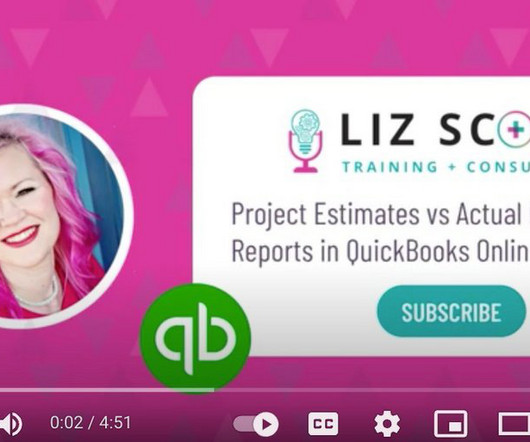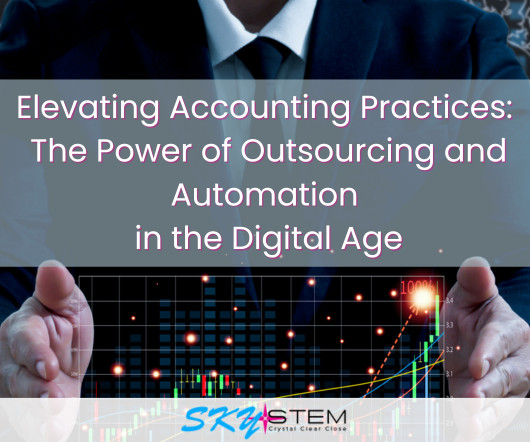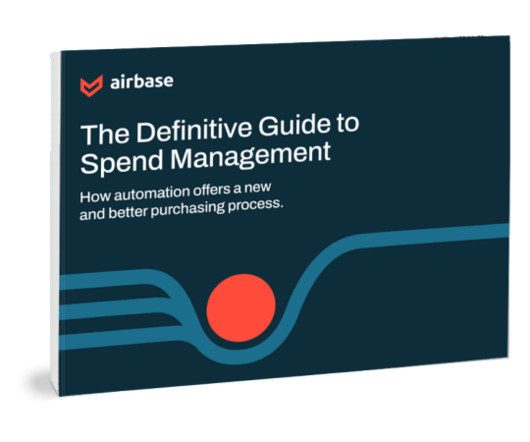Everything You Should Know About Soccer & Business
Insightful Accountant
MAY 21, 2023
Xero's Ben Richmond shares some takeaways every accountant can glean from the FIFA Women’s World Cup 2023.

Insightful Accountant
MAY 21, 2023
Xero's Ben Richmond shares some takeaways every accountant can glean from the FIFA Women’s World Cup 2023.

Accounting Tools
MAY 21, 2023
Related Courses The Balance Sheet The Interpretation of Financial Statements What are the Contents of a Cash Basis Balance Sheet? Under the cash basis of accounting , transactions are only recorded when there is a related change in cash. This means that there are no accounts receivable or accounts payable to record on the balance sheet , since they are not noticed until such time as they are paid by customers or paid by the company, respectively.
This site is protected by reCAPTCHA and the Google Privacy Policy and Terms of Service apply.

Insightful Accountant
MAY 21, 2023
Liz Scott is back with a new enhancement that makes this process even easier in QuickBooks Online Advanced. Check out her story and video.

Accounting Tools
MAY 21, 2023
Related Courses How to Audit Cash How to Audit Fixed Assets How to Audit Inventory How to Audit Receivables How to Conduct an Audit Engagement What are Management Assertions? Management assertions are claims made by members of management regarding certain aspects of a business. The concept is primarily used in regard to the audit of a company's financial statements , where the auditors rely upon a variety of assertions regarding the business.

Speaker: Nancy Wu, Head of Sales and Customer Success at SkyStem
Join us for an enlightening webinar as we delve into the transformative realm of modern accounting practices. In today's digital age, the convergence of outsourcing and automation has revolutionized how businesses manage their financial operations. In this webinar we will explore the synergistic potential of these two strategies to streamline processes, enhance accuracy, save cost and drive strategic decision-making.

IMA's Count Me
MAY 21, 2023
Dive deep into the world of Environmental, Social, and Governance (ESG) in business with our latest episode of the 'Count Me In' podcast. Hosted by a panel of experts, which includes Catie Serex, Douglas Hileman and Dan Mosher, our podcast uncovers the truth behind ESG, its importance in today's business world, the challenges it presents, and its potential role in fraudulent activities.

Accounting Tools
MAY 21, 2023
Related Courses Bookkeeper Education Bundle Bookkeeping Guidebook What is a Full Charge Bookkeeper? A full-charge bookkeeper is the same as a bookkeeper , except that the "full charge" part of the title designates the person as being solely responsible for accounting. This means that the full charge bookkeeper reports straight to a senior manager, such as the president, and may interact directly with the company's board of directors and auditors.
Financial Ops World brings together the best financial operations content from the widest variety of thought leaders.

Accounting Tools
MAY 21, 2023
Related Courses Bookkeeping Guidebook Closing the Books New Controller Guidebook What are Accounting Adjustments? An accounting adjustment is a business transaction that has not yet been included in the accounting records of a business as of a specific date. Most transactions are eventually recorded through the recordation of (for example) a supplier invoice , a customer billing, or the receipt of cash.

Accounting Tools
MAY 21, 2023
Related Courses Business Ratios Guidebook The Interpretation of Financial Statements What is the Profit Ratio? The profit ratio compares the earnings reported by a business to its sales. It is a key indicator of the financial health of an organization. The profit margin ratio is customarily used in each month of a month-to-month comparison, as well as for annual and year-to-date income statement results.

Accounting Tools
MAY 21, 2023
Related Courses Real Estate Accounting Real Estate Investing Property Management Accounting Real estate investing can be a highly profitable activity for many people. This is especially the case if you are willing to hold onto property for an extended period of time, to take advantage of property appreciation. However, it is also possible to go wrong in this area and lose your investment.

Accounting Tools
MAY 21, 2023
Related Courses Ethical Frameworks in Accounting Professional Rules of Conduct What is Confidential Client Information? Confidential client information is any client information that is not available to the public. Confidential information may include technology, trade secrets, information pertaining to business operations and strategies, and information pertaining to customers, pricing and marketing.

Speaker: Robbie Bhathal, Founder & CEO, and Matthew Acalin, Head of Credit Intelligence
In today's volatile financial environment, how confident are you in your company’s financial forecasting? To get the most accurate cash predictions that will lead to long-term financial survival, real-time data is critical. Innovative cash management strategies can lead to better credit opportunities, more sustainable growth, and long-term financial prosperity.

Accounting Tools
MAY 21, 2023
Related Courses Accountants’ Guidebook Bookkeeper Education Bundle Bookkeeping Guidebook What is a Journal Entry? A journal entry is used to record a business transaction in the accounting records of a business. A journal entry is usually recorded in the general ledger ; alternatively, it may be recorded in a subsidiary ledger that is then summarized and rolled forward into the general ledger.

Accounting Tools
MAY 21, 2023
Related Courses Corporate Finance Entrepreneur’s Guidebook What is the Death Valley Curve? The Death Valley curve is the period between when a startup company receives funding and when it begins to generate positive cash flow. During this period, because of the lack of cash flow, it is quite unlikely that the firm can obtain any additional funding, and so is at maximum risk of failure.

Accounting Tools
MAY 21, 2023
Related Courses Corporate Finance Crowdfunding What is a Demand Loan? A demand loan is a borrowing instrument that allows the lender to recall a loan on short notice. Once notified, the borrower must repay the full amount of the loan and any associated interest. This arrangement also allows the borrower to repay the loan at any time without an early repayment penalty.

Accounting Tools
MAY 21, 2023
Related Courses Business Insurance Fundamentals What is an Insurance Premium? An insurance premium is the cost required to obtain insurance coverage. The insured party pays the premium to the insurer either in advance of coverage or over the course of the coverage period. If the insured party fails to pay a premium, the related insurance coverage is cancelled, though it may be restored if the premium is subsequently paid.

Advertisement
All accounting teams know what it is like to dread the inevitable month-end scaries. If there was a way to feel less burdened and maybe even a little enthusiastic to work on your month-end close and reconciliation process, would you do it? No, don't answer that, of course you would! Automate your month-end close process by up to 40% with SkyStem's ART and see how much more alive you feel!

Accounting Tools
MAY 21, 2023
Related Courses How to Conduct an Audit Engagement What is Opinion Shopping? Opinion shopping is the practice of searching for an auditor that will issue an unqualified opinion on a company’s financial statements. An unqualified opinion indicates that the firm’s financial statements are fairly presented, and that they conform to the applicable accounting framework.

Accounting Tools
MAY 21, 2023
Related Courses Human Resources Guidebook Payroll Management A payroll card is a debit card into which employee pay is deposited. The original reason for these cards was to provide funds for unbanked employees. Advantages of Payroll Cards Payroll cards are superior to direct deposit in many ways, as noted below. First Payment is Electronic When paying an employee through direct deposit, the first payment to a new employee is with a check , since the bank wants to prenote the first direct deposit

Accounting Tools
MAY 21, 2023
Related Courses Accountants’ Guidebook Bookkeeper Education Bundle Bookkeeping Guidebook What is a Debit Balance? There are several meanings for the term debit balance that relate to accounting, bank accounts, lending, and investing. They are noted below. Debit Balance in Accounting A debit balance is an account balance where there is a positive balance in the left side of the account.

Accounting Tools
MAY 21, 2023
Related Courses Corporate Cash Management Corporate Finance Treasurer's Guidebook How to Sell Accounts Receivable You might choose to sell your accounts receivable in order to accelerate cash flow. Doing so is accomplished by selling them to a third party in exchange for cash and a hefty interest charge. This results in an immediate cash receipt, rather than waiting for customers to pay under normal credit terms.

Advertisement
The status quo for AP in small and mid-market companies is broken. It consists of messy tech stacks of siloed solutions that give rise to manual work, a lack of control, wasted spend, and unnecessary risks. The benefits of shifting to spend management are tangible, measurable, and are felt across the whole organization. Spend management is a different way of thinking and an innovation whose time has come.

Accounting Tools
MAY 21, 2023
Related Courses Revenue Management Revenue Recognition What is a Reference Price? A reference price is the price that a customer considers to be reasonable to pay for a product or service. A business should be aware of the reference price perceptions of customers when setting price points for company products. For example, if the reference price used by customers is the pricing range for a competitor's product line , a business could set its prices slightly lower than the competitor's prices.

Accounting Tools
MAY 21, 2023
Related Courses Accountants' Guidebook GAAP Guidebook A loan may require periodic compliance with lender covenants. A covenant violation may give a lender the right to demand immediate payment of the loan. A debt obligation should be classified as non-current, unless there has been a covenant violation that gives the lender the right to call the debt, and it is probable that the entity will not be able to comply with the covenant within the next 12 months.

Accounting Tools
MAY 21, 2023
Related Courses Accounting Controls Guidebook Accounting Procedures Guidebook What is an Authorization? Authorization occurs when a person with a certain level of authority gives permission for an action to take place. Stated differently, authorization occurs when you allow someone to do something. Authorization is a key component of the control systems used within an organization.

Accounting Tools
MAY 21, 2023
Related Courses Revenue Management Revenue Recognition What is Penetration Pricing? Penetration pricing is the practice of initially setting a low price for one's goods or services, with the intent of increasing market share. The low price is likely to attract price-sensitive customers. The price may be set so low that the seller cannot earn a profit.

Speaker: Carolina Aponte - Owner and CEO, Caja Holdings LLC
In today's rapidly changing business environment, building a resilient balance sheet is crucial to the survival of any business. A resilient balance sheet allows a company to withstand financial shocks and adapt to changing market conditions. To achieve this, companies need to focus on key strategies such as maintaining adequate liquidity, managing debt levels, diversifying revenue streams, and prioritizing profitability over growth.

Accounting Tools
MAY 21, 2023
Related Courses Business Ratios Guidebook Financial Analysis The Interpretation of Financial Statements What is EBITDA? EBITDA is a contraction of earnings before interest, taxes, depreciation , and amortization. It is used to evaluate the performance of a business before the impact of financing decisions. EBITDA approximates the operational results of a business on a cash flow basis.

Accounting Tools
MAY 21, 2023
Related Courses Behavioral Ethics Ethical Frameworks in Accounting Unethical Behavior What is Greed? Greed is the selfish want for more wealth or power than a person actually needs, and to the detriment of others. The concept can be taken further, where a person can never have enough, and so is always striving for more. The concept can be confused with the needs of an extremely ambitious person – the difference is that an ambitious person knows when to stop after having reached his or her goal.

Accounting Tools
MAY 21, 2023
Related Courses Public Company Accounting and Finance What is a Stock Register? A stock register is a detailed record kept of the shares issued by a corporation , as well as any repurchases and transfers between shareholders. A register is most commonly maintained by a publicly-held company, but can be kept by any corporation, especially when there are many shareholders.

Accounting Tools
MAY 21, 2023
Related Courses Behavioral Ethics Ethical Frameworks in Accounting Unethical Behavior What is Rational Choice Theory? Rational choice theory holds that individuals have preferences among the available alternatives, based on an analysis of the benefits to be gained, which are balanced against offsetting costs. The individual is expected to take into account all available information, the probabilities of outcomes, and best estimates of costs and benefits.

Speaker: Wayne Spivak, President and CFO of SBA * Consulting Ltd., Industry Writer, Public Speaker
If you’re lost in the world of spend management needs and your GAP analysis is lacking perspective on the future state of your business performance, listen up! With the advancement of technology, the implementation of spend management best practices and concrete GAP analyses is more streamlined and accessible than ever before. And while this may sound like great news for you and your clients, it won’t be worthwhile unless you have the latest techniques to back up your ambitions!

Accounting Tools
MAY 21, 2023
Related Courses Corporate Cash Management Investing Guidebook Treasurer's Guidebook An investor would buy a bond at a premium price when the bond’s stated interest rate is higher than the market interest rate. A premium bond is a bond whose current selling price on the open market is higher than its par (or stated) value. This situation arises when the stated interest rate on the face of the bond is higher than the market interest rate currently in existence.

Accounting Tools
MAY 21, 2023
Related Courses Activity-Based Costing Activity-Based Management Cost Accounting Fundamentals What is a Cost Pool? A cost pool is a grouping of individual costs , typically by department or service center. Cost allocations are then made from the cost pool. For example, the cost of the maintenance department is accumulated in a cost pool and then allocated to those departments using its services.

Accounting Tools
MAY 21, 2023
Related Courses Revenue Management Revenue Recognition What is Psychological Pricing? Psychological pricing is the practice of setting prices slightly lower than a whole number. This practice is based on the belief that customers do not round up these prices, and so will treat them as lower prices than they really are. Customers tend to process a price from the left-most digit to the right, and so will tend to ignore the last few digits of a price.

Accounting Tools
MAY 21, 2023
Related Courses Accountants' Guidebook GAAP Guidebook The Balance Sheet What is the Premium on Common Stock? The premium on common stock is the difference between the par value of a share of stock and the price at which a business sells the share to investors. Par value is the face value printed on a stock certificate ; it is usually quite small, with $0.01 per share being a common amount.

Advertisement
Developing a consistent month-end close doesn’t need to be a mystery. We’re sharing our top 10 secrets (plus one bonus!) for streamlining your close.
Let's personalize your content